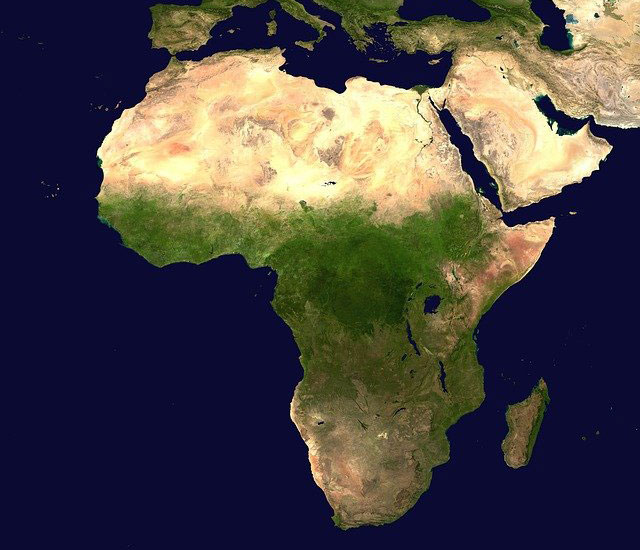Washington – The United States warned Tuesday that China and Russia were destabilizing Africa with their growing inroads as it rolled out the red carpet to the continent’s leaders and pledged billions of dollars in support.
Forty-nine African leaders flew into the Washington cold for the first continent-wide summit with the United States in eight years as President Joe Biden seeks to use personal diplomacy to win back influence.
Defense Secretary Lloyd Austin, at a panel with several African presidents at the start of the three-day summit, charged that US rivals had a different approach.
Austin said China was expanding its footprint in Africa “on a daily basis” through its growing economic influence.
“The troubling piece there is they’re not always transparent in terms of what they’re doing and that creates problems that will be eventually destabilizing, if they’re not already,” Austin said.
Russia was “continuing to peddle cheap weapons” and deploying “mercenaries across the continent,” he added.
“And that is destabilizing as well.”
But the Biden administration has been careful not to present Africans with an us-or-them choice, believing it is futile to try to turn the tide on China’s massive infrastructure spending.
Health and space cooperation
Biden plans to unveil $55 billion for Africa over three years. In one of the first announcements, the White House said the United States would invest $4 billion by the 2025 fiscal year to train African health workers, a rising priority for Washington since the Covid-19 pandemic.
The summit also brought in NASA, with Nigeria and Rwanda becoming the first African nations to sign the Artemis accords, a US-led bid for international cooperation on traveling to the Moon, Mars and beyond.
The Artemis accords, which already include European allies, Japan and several Latin American powers, come as China rapidly expands its own lunar program and as tensions with Russia threaten its post-Cold War work with the United States on space.
China has rejected criticism of its role in Africa, with its ambassador in Washington, Qin Gang, saying the continent should not be a place for “major powers’ competition.”
ALSO READ | US-Africa summit: four things African leaders should try to get out of it
In Beijing, Chinese foreign ministry spokesman Wang Wenbin told reporters on Wednesday that Washington “should respect the will of the African people and take concrete actions to help Africa’s development, instead of concentrating its efforts on smearing and attacking other countries.”
The US-Africa summit is the first since Barack Obama invited leaders in 2014, with his successor Donald Trump making no secret of his lack of interest in Africa.
Security remains a major focus of the United States, which has used the summit to focus on some of the continent’s hotspots.
Ethiopian Prime Minister Abiy Ahmed, a onetime US ally whose relations with Washington soured sharply over the Tigray war that broke out two years ago, paid his first visit to Washington since the conflict.
Meeting him inside central Washington’s convention center, Secretary of State Antony Blinken voiced hope over an agreement signed last month in South Africa between Ethiopia’s government and Tigrayan rebels.
“We have, I think, a historic moment for the country,” Blinken told him.
Climate and security
The United States also announced another $411 million in assistance for Somalia where a new assessment found “catastrophic” hunger, even though the United Nations said aid has averted a full-blown famine.
The Horn of Africa has been devastated by five consecutive failed rainy seasons, with Somalia already struggling after decades of turbulence and Al-Shabaab jihadist rebels.
“These climate shocks have weakened the society,” Somali President Hassan Sheikh Mohamud said, ahead of expected announcements by Biden on climate efforts in Africa.
Democratic Republic of Congo President Felix Tshisekedi, in talks with Blinken, blamed climate change for floods that have killed some 100 people in the capital Kinshasa.
In Somalia, Mohamud also claimed successes against the rebels, days after Somali forces seized the key town held by jihadists since 2016 with the help of US air strikes and an African Union force.
ALSO READ | US hits Zimbabwean President Emmerson Mnangagwa’s son with sanctions ahead of Africa summit
But he warned that military means alone were insufficient.
“I have been telling my colleagues today that engaging with the society and the community is what makes these terrorists like a fish that has run out of water; they cannot exist without a community,” he said.
The Biden administration has stressed working with the African Union, both on the security and diplomatic fronts.
Biden during a speech on Wednesday is expected to outline US support for the African Union to gain a formal berth in the Group of 20 club of major economies, months after he threw support behind a permanent African seat on the UN Security Council.
African Union chief Moussa Faki Mahamat hailed US support but warned that there was still far more focus on fighting extremists in the Middle East.
“This double standard has had disastrous consequences for Africa and for peace and democracy in the world,” he said.
Follow African Insider on Facebook, Twitter and Instagram
Source: AFP
Picture: Pixabay
For more African news, visit Africaninsider.com


